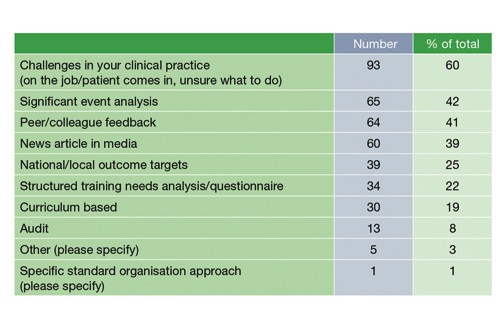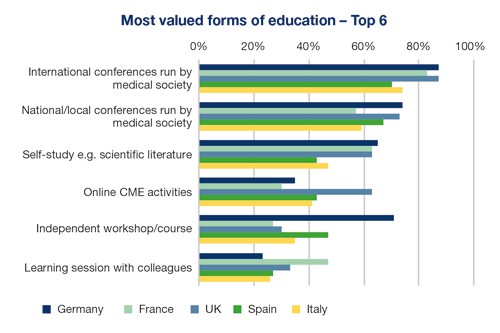
Effective medical education is about helping physicians improve patient outcomes. But as the pace of scientific innovation accelerates and as new forms of digital exchange evolve, it is far from clear how this can be achieved. In a survey from the M3 Europe physician network, cardiologists reveal some interesting insights about how they like their learning packaged.
Cardiologists, like physicians in all therapeutic disciplines, are expected to continue learning throughout their careers. How they choose to do that is changing fast, however, as digital channels create new options for learning, as opportunities to attend conferences are affected by transparency in the pharma-physician relationship and as physicians themselves adjust differently to the new medical education landscape as it evolves.
To get a sense of how cardiologists keep abreast of developments, M3 Global Research asked 155 senior practitioners from M3 Europe’s physician network (31 from Germany, 30 from France, the UK and Spain, and 34 from Italy) how they:
- Identify their learning needs and educate themselves
- Describe what good education looks like
- Feel about online learning and formal accreditation
- Expect their educational needs to be delivered in the future
1. Identifying learning needs
The cardiologists were invited to select up to three answers to convey how they recognise gaps in their knowledge. Their answers, presented in Figure 1, suggest they largely identify their learning needs from ‘known unknowns’. These are, for example, challenges in their day-to-day clinical practice when things go wrong (60% of total responses) or feedback from their peers (41%).
But these methods do not reveal the ‘unknown unknowns’ as the respondents are not necessarily being challenged about areas outside their current clinical practice or how patients with a certain condition are managed in another healthcare system. Curriculum-based learning or structured training-needs analysis, for example, only attracted 19% and 22% of the responses respectively.

Figure 1: Which of the following are more important in helping your identify your learning needs?
2. What does good medical education look like?
Perhaps unsurprisingly, cardiologists want educational materials that are unbiased, accurate and relevant. These were the top results when asked to rank various attributes of medical education. But when asked about their propensity to take part in programmes in relation to: (1) the sponsoring organisation (independent bodies such as the European Society of Cardiology or an unrestricted grant from pharma), and (2) the author of the materials (leading expert, colleague or independent medical writer), the results are less obvious.
Figure 2 shows that while pharma money slightly depresses a physician’s willingness to participate, the expertise of the author is a far more important concern. In total, 76% of cardiologists are either very likely (19%) or fairly likely (57%) to attend an educational activity led by a leading expert even when the sponsorship comes from an unrestricted grant from the pharma industry.
In terms of the most valued forms of education, cardiologists were asked to select up to five options and Figure 3 reveals an overwhelming preference for medical society conferences as well as interesting differences among the other options. Cardiologists in Germany, for example, show a much greater preference for independent workshops. And personal study of the scientific literature would seem to be valued more highly by cardiologists in the northern European countries of Germany, France and the UK than by those in Spain or Italy.

Figure 2: EU5 average % scores for propensity to participate
3. Online learning
When it comes to valuing online continuing medical education (CME), Figure 3 reflects the extent to which the respondents already benefit from online learning. The EU5 average for current learning is 49% offline and 51% online. Those with the highest online learning scores (UK, 59%; Spain, 56%) are also those, again unsurprisingly, who value online CME more than their colleagues. Those with the lowest scores (Germany, 39%; France, 41%) show the converse.
In terms of how physicians prefer such education to be delivered, the cardiologists were invited to select three options in Figure 4 and showed a significant preference for written summaries and presentations. Indeed, these two options often scored more than all the other options combined.
They were also asked how long they like to spend studying in front of a screen. In this respect, the French showed lower tolerance levels than anyone else with no-one prepared to spend more than an hour and 10% opting for less than five minutes. In contrast, 18% of the Italians are happy with sessions of more than an hour and no-one opted for less than five minutes.

Figure 3: Which of the following do you value most in your day-to-day practise?
4. How CME will evolve in the future
Finally, the cardiologists were asked about how CME will evolve in the future. On average, more than 50% of cardiologists in Europe want more online CME. But significant regional variations can be seen with 73% of Italians calling for this and only 10% of Germans. Moreover, the Germans only want online CME if the providers are German. And they are also overwhelmingly in favour (84% versus EU5 average figure of 45%) of conferences and face-to-face education, both of which continue to be important options for cardiologists but are confronting significant challenges in terms of funding and time constraints.

Figure 4: EU5 average of preferences of online delivery methods, % of total responses
Conclusions
The insights from this survey reveal that Europe’s cardiology community:
- Identify their educational needs largely from challenges that present in clinical practice, feedback from colleagues and significant event audit.
- Consider the expertise of the author to be more important than who sponsors the education.
- Are confused about the CME systems in their countries, what CME credits consist of and how they are measured.
- Differ significantly by country in how they see the future of CME.




